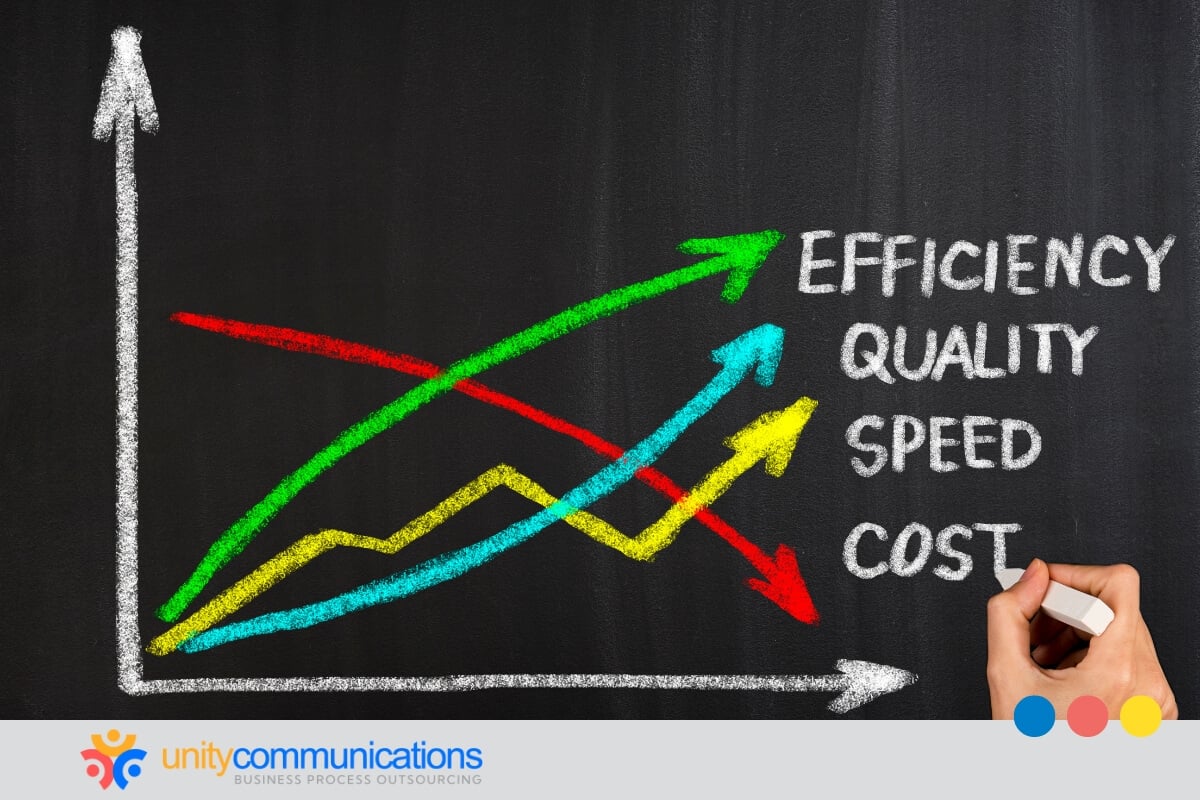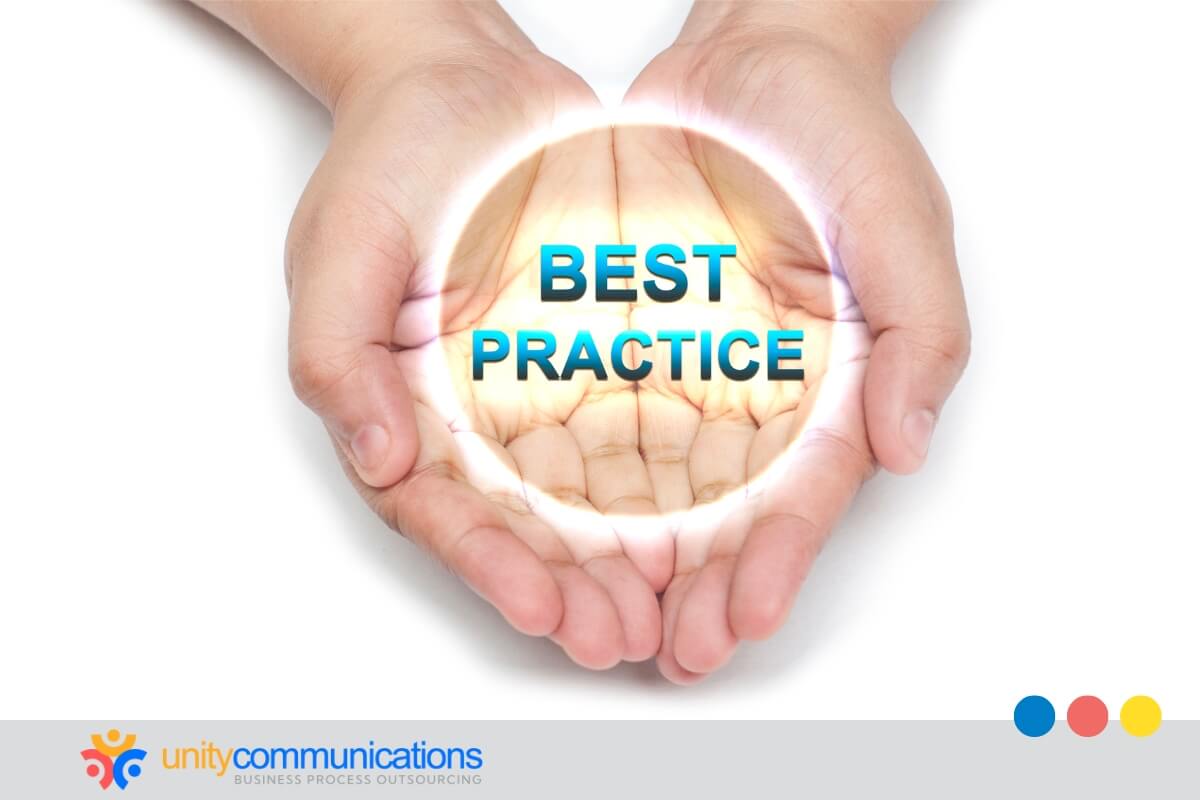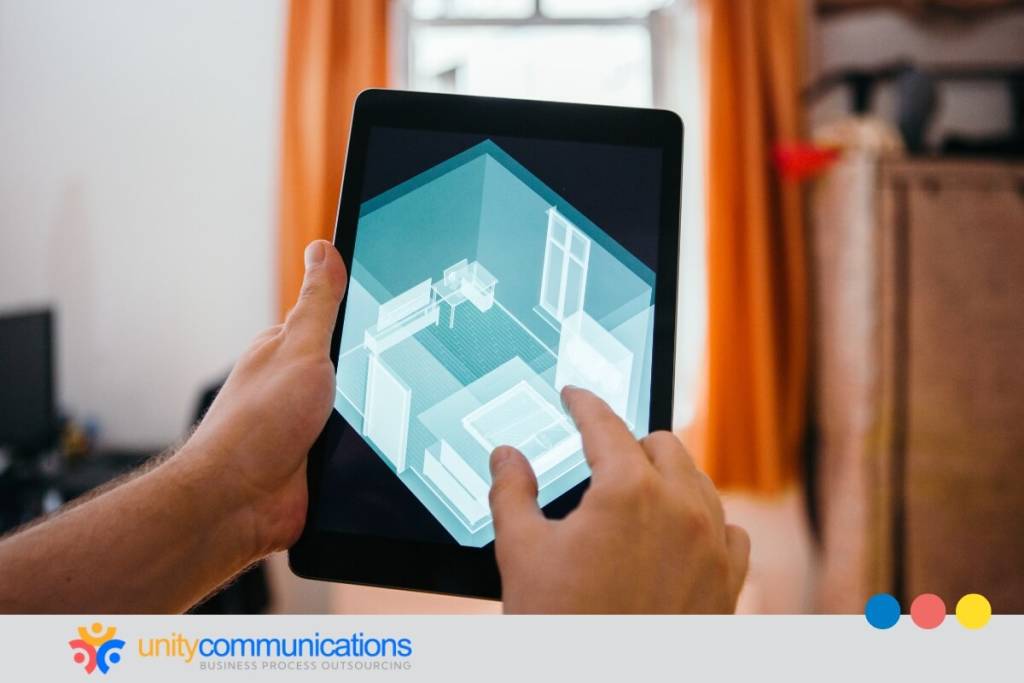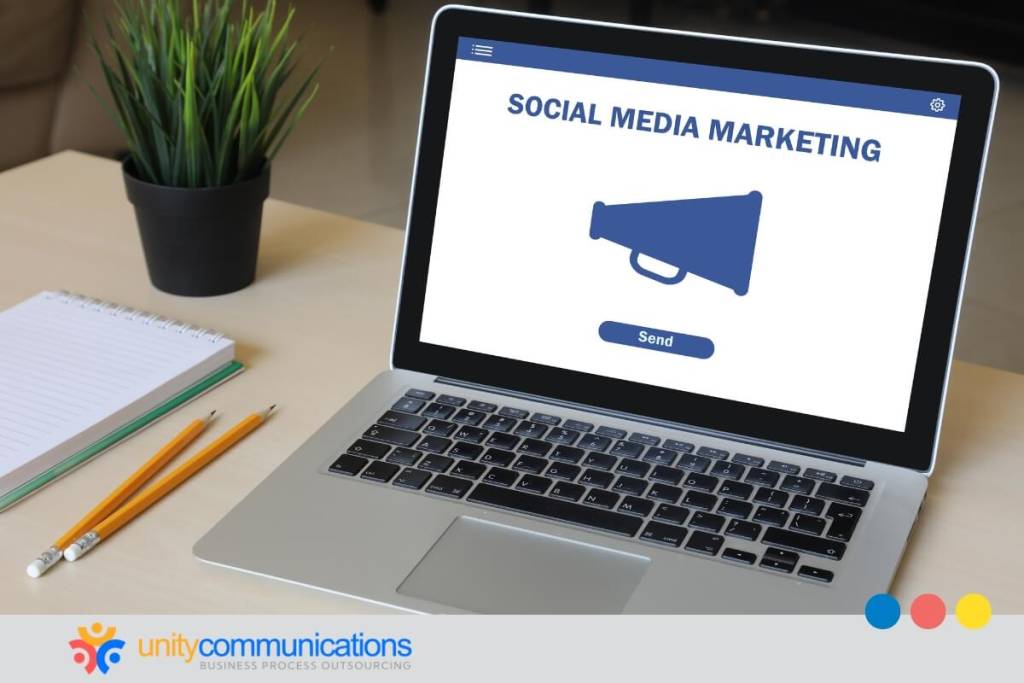Table of Contents
Advanced technology and methods drive success in today’s real estate market. One such innovation is virtual staging, which attracts more clients by allowing them to visualize properties through digitalization.
Business process outsourcing (BPO) develops virtual staging initiatives. Real estate BPO services streamline the process of digitally furnishing properties, offering cost-effective solutions that replace traditional staging methods.
Continue reading to discover more about BPO virtual staging services for Realtors.
Understanding virtual staging: Basics and benefits

Virtual staging is an innovative real estate marketing technique that uses technology to digitally decorate vacant homes. Compared to traditional staging, which involves physically arranging furniture and decor in a house, virtual staging uses specialized software to produce realistic pictures of a completely furnished space.
The process includes the following:
- Virtual staging software. Skilled digital artists use the latest software to add furniture, decor, lighting, and other elements to high-resolution pictures of vacant areas.
- Design customization. Virtual staging customizes layouts, furniture styles, and colors to suit buyer demographics and property styles, optimizing visual appeal.
- 3D rendering. This technique improves realism by blending virtual elements with real-world visuals, resulting in a lifelike portrayal.
- Augmented reality (AR) and virtual tours. Some technologies combine AR and virtual reality (VR) to allow prospective buyers to interact with digitally generated spaces.
- Feedback and adjustments. Property professionals review staged images to determine whether the designs meet marketing goals and preferences.
- Final presentation. For effective property promotion, clients integrate the approved images and tours into online listings, social media, and virtual open houses.
Advantages of virtual staging for real estate sales
Virtual staging offers several advantages for real estate businesses. These include:
- Cost-effectiveness. Depending on the property size and rental duration, traditional staging can cost between $841 and $2,935 for initial setup. Virtual staging costs significantly less, around $300, according to Forbes.
- Time efficiency. Virtual staging is swift. Designers can add digital furniture and decor within days after photographing the empty property. This capability accelerates listing and buyer interest.
- Look and feel. Virtual staging increases attractiveness by digitally furnishing spaces and helping buyers visualize living in the home. Realistic visuals draw more interest and engagement from those browsing online listings.
- Flexibility and customization. Virtual staging offers unmatched adaptability. Real estate agencies can customize designs for diverse buyer demographics. Designers can adjust decor and room layouts to highlight the property’s potential for various audiences.
- Versatility across property types. Virtual staging fits diverse properties, from vacant homes to commercial spaces. It adapts to various architectural styles and layouts to enhance marketability across real estate listings.
- Site visits. Virtual staging reduces property disorder compared to traditional staging. It eliminates scheduling conflicts and becomes less intrusive for occupants.
- Geographical reach. Virtual staging broadens property marketing presence. High-quality digital images shared across online platforms and social media enhance property visibility and attract more potential buyers.
- Staging consistency. Virtual staging ensures uniform presentation across multiple listings. It offers cohesive marketing and accurate design replication for real estate professionals.
How BPO facilitates virtual staging services for Realtors

What is BPO, and how does it facilitate virtual staging services for Realtors? Outsourcing involves contracting service providers to manage specific business activities. Realtors employ third-party professionals and advanced software to furnish properties digitally and produce realistic visuals for virtual staging.
BPO providers also supervise non-core tasks, including customer service, human resources (HR), bookkeeping, data entry, and information technology (IT) assistance. As such, property managers and real estate agents can focus on selling properties, building relationships, and honing marketing strategies.
Explore how outsourcing works to facilitate and enhance virtual staging services for Realtors:
Cost efficiency
Outsourced virtual staging services offer Realtors more cost savings than maintaining an in-house virtual staging team.
Outsourcing virtual staging to nearshore and offshore BPO companies removes the need for Realtors to hire full-time designers, buy costly software, and invest in ongoing training. In-house teams necessitate salaries, benefits, workspace, and equipment, resulting in significant financial investments.
In contrast, outsourcing firms offer on-demand specialized services, so real estate agencies pay only for what they need. BPO teams employ sophisticated software to stage items efficiently without incurring physical item expenses or personnel.
Image quality and realism
Virtual staging services boost image quality and realism for Realtors, significantly influencing how potential buyers perceive the properties.
BPO companies employ professionals specializing in digital design and staging. These experts use the latest virtual staging technologies to digitally enhance images of vacant buildings. They use 3D rendering techniques to develop lifelike photos of homes.
Skilled designers also place virtual furniture, decor, lighting, and details in the image. They then adjust the color, texture, and scale with advanced software for seamless integration. Realistic virtual staging allows buyers to envision themselves living in the house, increasing its appeal across demographics.
Consider the benefits of enhanced image quality and realism for Realtors:
- Increased buyer involvement. High-quality, lifelike photos capture the attention and engagement of potential customers reading internet listings or marketing materials.
- Global reach. Enhanced photographs can be easily shared across digital media, increasing the property’s visibility to a larger audience locally and worldwide.
- Reduced environmental effect. By eliminating the need for physical furniture and resources, virtual staging promotes sustainability and lowers the carbon footprint associated with traditional staging.
- Higher sales potential. Properties with high-quality, realistic images are more likely to stand out and attract attention and offers from potential buyers.
Speed and scalability
BPO organizations offer virtual staging services that can enhance speed, scalability, and operational efficiency for Realtors and property developers. Consider the following ways service providers contribute to these advantages:
- Rapid resource allocation. Third-party vendors can quickly allocate resources based on real estate market demands. During sudden increases in property listings, they scale up their workforce of skilled designers and digital artists to efficiently handle higher volumes of staging projects without compromising service quality.
- Flexible operations. BPO enterprises can adjust their capacity swiftly, so real estate agencies have sufficient resources to meet demands without the overhead costs of maintaining a large in-house team.
- Efficient workflow management. Service providers optimize virtual staging tasks with advanced software to enhance property photos rapidly and accurately. This efficiency cuts turnaround times, allowing housing agents to list properties and seize market opportunities promptly.
- Seasonal adaptability. Seasonal market shifts demand adaptive strategies. BPO companies adapt to provide consistent support for Realtors during busy and quiet periods. This strategic approach maintains steady marketing efforts throughout the year.
- Enhanced speed to market. BPO firms’ quick turnaround enables properties to be staged, photographed, and listed promptly, boosting visibility and attracting buyers faster. This agility is vital in competitive real estate, where timing significantly affects sales outcomes.
Customization and flexibility in staging designs
Third-party virtual staging services offer unparalleled customization and flexibility in staging designs, benefiting Realtors. Here’s how these services enhance real estate marketing efforts:
- Tailored designs for target demographics. BPO vendors tailor staging designs to different buyer demographics to boost sales. For example, a city loft for young professionals features modern, minimalist furniture and vibrant accents. Meanwhile, a suburban home is staged with child-friendly spaces, cozy furniture, and neutral tones.
- Versatile services across property types. The outsourcing firms’ virtual staging extends beyond residential properties to commercial spaces and rentals. This versatility allows Realtors to stage different listings, highlighting properties’ unique features and potential.
- Adaptable design themes. Realtors might request design motifs that reflect current market trends, local design preferences, or the property’s distinctive style. From modern and minimalist to traditional and warm, BPO organizations can tailor staging ideas to the desired aesthetic, increasing the property’s appeal.
- Quick revisions and updates. One advantage of BPO firms’ virtual staging services for Realtors is that they can quickly revise and update designs. Service providers can promptly adjust the staged visuals to match marketing strategies, buyer expectations, and the Realtor’s feedback.
Service quality and professionalism
Besides designers, third-party providers also employ virtual assistants (VAs). But what is a real estate VA? This professional provides administrative and marketing support to Realtors, including virtual staging, listing management, client communication, and social media marketing.
One reason to hire a real estate VA through a BPO provider is the guaranteed professionalism. The third-party company empowers its VAs to produce high-quality results, complete projects within schedule, and communicate effectively with current clients and prospective buyers.
Check the other compelling reasons to hire third-party real estate VAs and similar professionals:
- Advanced tools. BPO companies equip their VAs with cutting-edge virtual staging software and tools. This access provides high-quality staging outputs and keeps Realtors ahead of the competition.
- Global talent pool. Outsourcing firms tap international talent, letting Realtors collaborate with skilled VAs worldwide who can provide diverse perspectives and innovative staging solutions.
- 24/7 availability. BPO in real estate offers round-the-clock support, ensuring Realtors receive prompt assistance for urgent tasks.
- Reliability and accountability. BPO organizations have processes and metrics to monitor dependability and transparency. This organized strategy guarantees that VAs provide consistent, high-quality care while meeting Realtor expectations.
- Expertise and training. Third-party providers often employ real estate VAs who undergo rigorous training and specialize in virtual staging and real estate marketing. This makes them well-versed in the latest industry trends and best practices.
Finding the right virtual staging service provider for Realtors
Working with the ideal BPO partner is necessary to enhance property presentations and attract potential buyers effectively. Use these recommendations in choosing the right provider:
- Expertise and experience. Seek virtual staging providers with in-depth real estate knowledge. Review portfolios for high-quality, realistic visuals resonating with your target audience.
- Technology and tools. Check advanced virtual staging tools, including 3D rendering capabilities, to develop lifelike property images and improve listing competitiveness in the market.
- Customization options. Pick a BPO provider offering customization options. This way, real estate agencies can effectively adjust staging designs based on property type, demographics, and regional preferences.
- Turnaround time. Consider the outsourcing firm’s turnaround time for virtual staging projects. A quick turnaround is crucial for promptly updating listings and attracting buyer interest.
- Cost and value. Compare pricing models among potential partners, prioritizing value over price. Consider quality, customization, scalability, and customer service.
- Client reviews and reputation. Check client testimonials and real estate case studies for reputation and track record. Positive feedback and successful projects signal reliability, service quality, client satisfaction, and effective collaboration.
- Customer support. Evaluate BPO partner’s support. It must have responsive channels for prompt issue resolution. Effective communication is needed for a smooth staging process.
- Integration with real estate platforms. The BPO firm’s system should integrate well with existing platforms and listing services for easy uploads and updates.
- Industry knowledge and trends. Opt for a BPO provider that is well-versed in real estate trends and offers proactive staging strategies aligned with market preferences.
- Trial or sample projects. Request a trial project to assess the provider’s capabilities. Assess its work quality, adherence to deadlines, and suitability to business needs.
Best practices: Collaborating for virtual staging services

Effective collaboration with a BPO organization is essential for virtual staging services. Consider these best practices to promote smooth communication, high-quality deliverables, and favorable outcomes:
- Define primary points of contact and preferred integration modes (email, phone, project tools). Conduct regular updates on project progress and issues.
- Outline project requirements, such as staging designs, property types, demographics, turnaround times, and customization needs. They should align with BPO partner capabilities.
- Consider market swings and decide on realistic timetables and targets. BPO companies manage various projects while harmonizing expectations for timely, quality delivery.
- Implement quality assurance (QA) with samples or trials to assess capabilities. Define criteria for image quality, realism, and staging guidelines before deployment.
- Ensure outsourcing partners can adapt to market changes, accommodating last-minute revisions without compromising quality or timelines.
- Create effective feedback loops for staged images to highlight strengths, identify improvements, and refine designs through open dialogue.
- BPO providers must prioritize data security and privacy, adhering to robust measures for secure file transfer and confidentiality agreements.
- Implement key performance indicators (KPIs) to monitor project completion, client satisfaction, and deadline adherence for optimized outcomes.
- Encourage ongoing enhancements to innovate staging techniques, adopt new technologies, and refine processes based on market feedback and trends.
- Formalize deals with clear terms on deliverables, pricing, payment schedules, and dispute resolution to ensure accountability and mitigate risks.
The bottom line
Outsourcing enhances virtual staging for Realtors by offering cost efficiency, image quality, scalability, customization, flexibility, and consistent professionalism. Realtors benefit from advanced tools, global talent, 24/7 support, reliability, and expertise.
Finding the ideal BPO partner is necessary to attract potential buyers successfully. The right outsourcing provider can boost property marketing efforts and increase sales efficiency.
Discover the power of virtual staging and transform your listings today. Let’s connect to learn more about virtual staging services for Realtors. Unity Communications can help upgrade your property presentations and drive sales!



